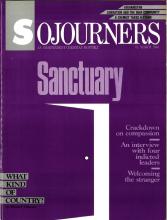I recently returned to our magazine office from a meeting downtown and was unexpectedly met at the front door by two men dressed in business suits. One cordially introduced himself as Mr. Bendery, an Internal Revenue Service agent. We had talked on the phone before, and I recognized his voice. We shook hands.
He turned to introduce me to his stern-faced companion, Mr. Lipsett. Before I could raise my arm to shake his hand, Mr. Lipsett stiffly reached inside his suit coat and pulled out and flashed his Treasury Department badge for my inspection. They had come as a final step in the IRS collection process before seizing our funds or taking more serious action.
This was not the first time I had talked with IRS agents about our tax resistance. Since our earliest days, the non-payment of war taxes has been a vital part of our witness at Sojourners. Both as individuals and as a non-profit corporation, we have resisted the payment of war taxes. This posture has given us many opportunities to dialog with the IRS.
We began publishing in 1971 during the height of the Vietnam War, a conflict we unequivocally opposed. It soon became clear that refusal of war tax payment was for us as morally necessary as our refusal of military induction. We could not oppose that war in every other way and then help pay for it. In those early days, we refused war tax payment by holding our earnings below the taxable income level and withholding the war tax portion of our phone bill.
With the burgeoning nuclear arms race and the expanding conflict in Central America, our stand on war tax resistance remains unchanged. As peacemakers and disciples of Jesus, we cannot with good conscience voluntarily provide our government—through our tax dollars—with the necessary means for nuclear preparedness and military intervention.
Read the Full Article

